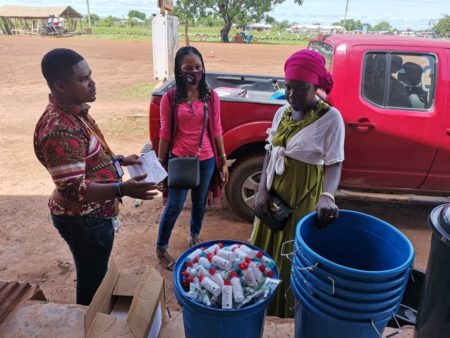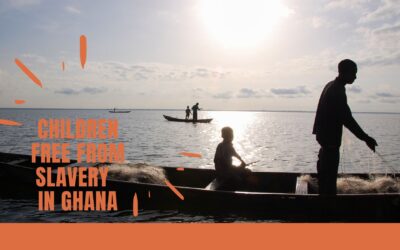One of the most significant impacts of the COVID-19 pandemic is the effect that lockdowns and other health safety measures are having on the economy. That’s especially true in rural villages in Ghana.
Several national and international organizations here have closed offices completely, while others have their staffers working from home and not in vulnerable communities. Restrictions on crowd sizes have hindered effective communication about the virus at the grassroots level, and limitations on travel have affected the livelihoods of ordinary Ghanaians.
Fortunately, the Free the Slaves model for village savings and loan associations (VSLAs) has helped communities improve public safety while maintaining local economic health.
The associations are designed to build economic resiliency. Villagers can borrow from the community-run association rather than a predatory moneylender or trafficker in times of financial emergency. Entrepreneurs can borrow to keep small business afloat during down cycles. Families have a safe place to create savings in places where there are no banks. The associations are run by and for the community itself.
More than 30 VSLAs that Free the Slaves and our Ghana partner organizations have helped establish are still operational during the COVID-19 pandemic. They have not only helped village economies, they’ve become key sources of health information and personal protective equipment.

Sanitizer and bucket distributiuon
Meetings are conducted outside, demonstrating proper social distancing techniques. The gatherings include intensive education on the virus, including effective hand washing demonstrations, how to recognize signs of the virus, what to do if someone falls ill, and other national protocols on COVID-19 in Ghana.
Free the Slaves has provided the associations with hand sanitizers, hygiene buckets and masks to ensure they operate in a safe environment.
“We able to support the very poor within the group to buy basic foodstuffs during the lockdown. This will not have happened if we had stop meeting” says the chairperson of VSLA in Asutsuare.
Poverty is a key driver of child trafficking, as desperate families send children away in return for small payments and hopes they will receive remittances in the future. VSLAs are designed to ease economic pressure on families. It’s a vital step in changing the conditions that allow modern slavery to exist.
And it’s especially important during COVID-19’s widespread economic shock.
Read more about our Growing Up Free program to combat child trafficking in Ghana here.

